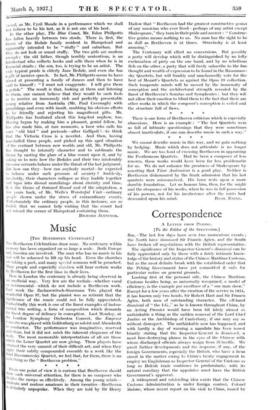Music
[THE BEETHOVEN CENTENARY.]
TIIE Beethoven Celebrations draw near. No centenary within memory has been organized on so large a scale. Both Europe and America are involved. The man who has no music in his Saul will be ashamed to lift up his head. Even the churches :ire taking a part, and many special sermons will be preached. Many people and especially children will hear certain works by Beethoven for the first time in their lives.
Here in London the centenary is already being observed in in unofficial way. Very few are the recitals—whether vocal or instrumental—which do not include a Beethoven work. last week the Zacharewitsch-Sisserman Trio played the wonderful Opus 97, but the pianist was so reticent that the significance of the music could not be fully appreciated. Undoubtedly this work is one of the finest examples of instru- mental trio writing, a form of composition which demands the finest degree of delicacy in conception. Last Monday, at the London Symphony Orchestra -Concert, the Emperor k once do was played with Goldenburg as soloist and Abendroth as conductor. The performance was imaginative, reserved and clean, but it did not catch the inherent eloquence of the work. The most memorable interpretations of all are those 1,1lieh the Lener Quartet are now giving. These players have stained the very summit of their difficult art, and when they "PP1Y their subtly compounded ensemble to a work like the third Ra.soumovsky Quartet, we feel that, for them, there is no s'n.11 thing as the " Beethoven problem." .
From one point of view it is.curious that Beethoven should draw such universal attention, for there is no composer who dhides the camps so effectively. , Among the young rebels- st udents and zealous amateurs in their twenties—Beethoven '8 definitely unpopular. When they are told by Sir Henry Hadow that " Beethoven had the greatest constructive genius of any musician who ever lived—perhaps of any artist except Shakespeare," they turn in their pride and answer " Construc- tive genius means nothing to us. No man has the right to be as dull as Beethoven is at times. Stravinsky is at least amusing."
The Centenary will effect no conversions. But possibly a party will develop which will be distinguished by no lofty exclamation of piety on the one hand, and by no rebellious itch on the other, a party that will freely subscribe to the fine thought and wealth of expression to be found in the Rasoumov- sky Quartets, but will frankly and unashamedly vote for the best of Mozart's Quartets as against the Opus 18 collection. Such temperate minds will be moved by the immensity of conception and the architectural strength revealed by the finest of Beethoven's Sonatas and Symphonies ; but they will not allow their emotion to blind them to the fact that there are other works in which the composer's conception is veiled and the structure full of flaws.
There is one form of Beethoven criticism which is especially obnoxious. Here is an example : " The last Quartets were so full of intimate questionings that they were sometimes almost inarticulate, if one can describe music in such a way."
We cannot describe music in this way, and we gain nothing by hedging. Music which does not articulate is no longer music. We arc too fond of excusing Beethoven in appraising the Posthumous Quartets. Had he been a composer of less renown, these works would have been far less problematic for us. We do not enhance the greatness of Shakespeare by asserting that Titus Andronicus is a good play. Neither is Beethoven dishonoured by the frank admission that his last quartets were misconceived. His fame rests upon a more durable foundation. Let us honour him, then, for the might and the eloquence of his works, when he was in full possession of his powers, not for his incoherence after the mists had






























































 Previous page
Previous page